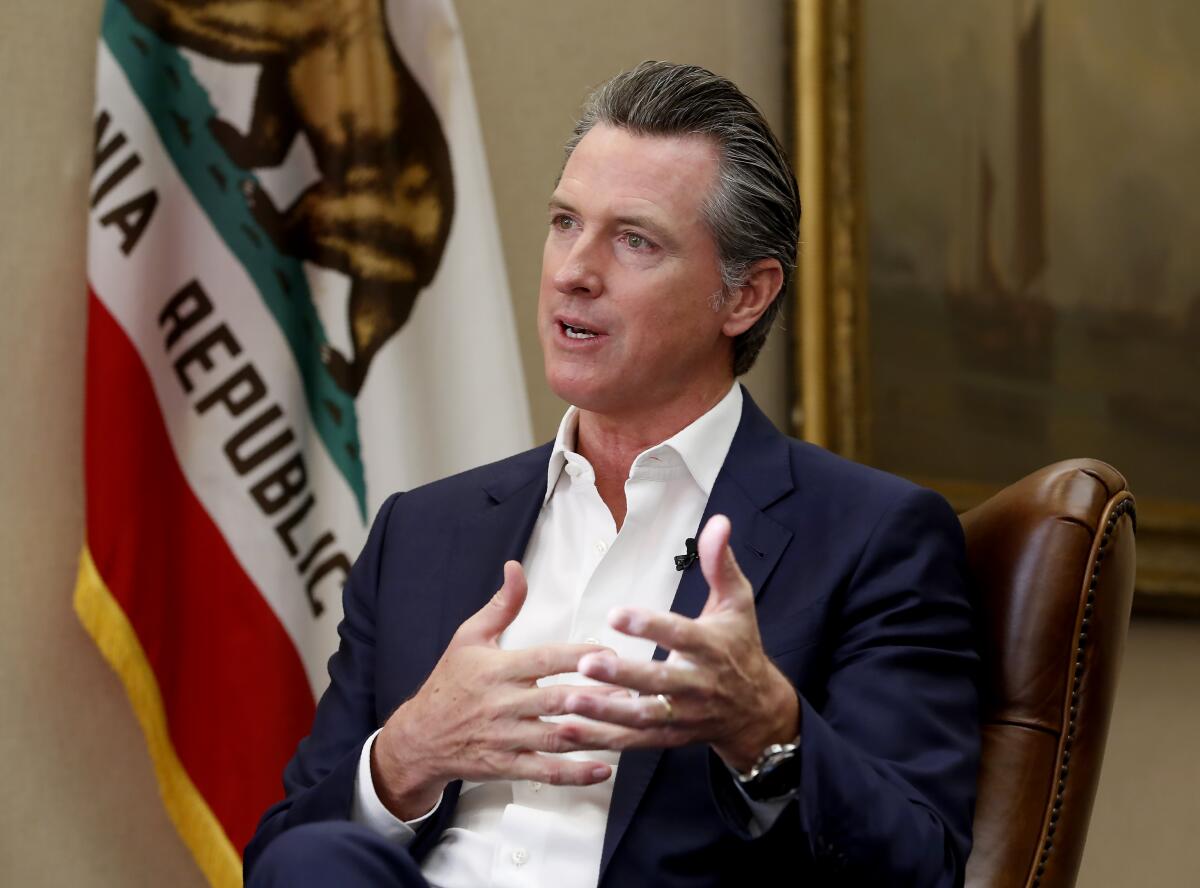Gov. Gavin Newsom reports $1.2-million income in new disclosure of tax returns

- Share via
SACRAMENTO — California Gov. Gavin Newsom and his wife, documentary filmmaker Jennifer Siebel Newsom, reported an income of $1.2 million in 2018, including $800,000 from the governor’s wineries, restaurants, hotels and other hospitality businesses.
The Newsoms’ tax returns provide a window into a complex network of the family’s financial interests throughout California, holdings that have helped them earn an average of more than $1 million a year since 2011 and purchase a $3.7-million, six-bedroom home just outside of Sacramento shortly before he took office last year.
On Friday, Newsom allowed reporters to view his 2018 federal and state tax returns that he filed jointly with his wife, which covered his final year as California’s lieutenant governor. Newsom filed those returns last fall after receiving an extension from the Internal Revenue Service.
The Newsoms reported paying $480,179 in income taxes — $358,724 to the federal government and $121,455 to the state of California.
The Newsoms, who have four young children, paid $244,000 for household services, primarily child care — a figure that included $55,017 in withholdings for Social Security, Medicare and federal income tax.
In 2018, Siebel Newsom earned a salary of $150,000 as head of her foundation, the Representation Project, and a $111,000 salary from her film production company, Girls Club Entertainment. Newsom reported $131,000 in earnings as the state’s lieutenant governor.
The couple also reported donating $25,683 to charity, including to Best Buddies, a nonprofit that assists people with intellectual and developmental disabilities that was founded by Anthony Kennedy Shriver, the brother of former California First Lady Maria Shriver. A complete list of the charities to which the Newsoms donated was not available.
Among the more unusual expenses declared in the Newsom’s tax documents was $899 for silver and platinum storage. Newsom’s tax returns from previous years showed that he made hundreds of thousands of dollars trading silver bars.
During his successful 2018 campaign, Newsom released his tax returns from 2011 onward and, after his election, the Democratic governor vowed to release his taxes each year while in office. His predecessor, former Gov. Jerry Brown, refused to release his tax returns while in office or during his campaigns.
Last July, Newsom signed a law to require all candidates for president and governor to release five years of tax returns if they wanted to appear on California’s primary ballot, a measure aimed directly at President Trump for his refusal to make his taxes public.
“Folks think @realDonaldTrump is avoiding tax release because he pays a very low rate,” the governor tweeted in May 2016. “I think its because his finances are a house of cards.”
The California Supreme Court, however, struck down the requirement for presidential candidates, saying it violated the state Constitution. The court upheld the provision that requires candidates for California governor to release their tax returns, starting in 2022. Newsom would need to provide additional returns, beyond those released so far, to satisfy the law’s provisions.
Newsom allowed reporters to review — but not photocopy — his 2018 tax years at the state Capitol on Friday. One reporter from each media outlet was given 45 minutes to examine the returns, a stack of tax documents roughly two inches think.
Newsom often cites his business expertise as a key credential in his ability to govern a state as complex as California, one of the most economically diverse states in the union.
With the help of the wealthy Getty family, heirs to a family oil fortune, Newsom opened a San Francisco wine store in 1992, expanding it over the last 25 years into a network of nearly two dozen businesses known as PlumpJack Group. The businesses include Napa Valley wineries, hotels in Lake Tahoe and Palm Springs, and bars and restaurants in San Francisco.
Newsom placed those investments in a blind trust before he was sworn in as governor. Under the terms of the blind trust, the trustee has total authority over the assets, including the power to sell off Newsom’s business ownership without consulting him, according to the governor’s office. The trustee is barred from discussing those decisions with Newsom.
Most of those assets remain in his financial portfolio, however, and were listed in his 2019 statement of economic interests filed with the California Fair Political Practices Commission.
The disclosure reflected more than $6 million in investments and assets. His Airelle Wines Inc. and a related entity, Villa Encinal Partners, each had a fair market value of over $1 million each, the record showed.
The Newsoms also received more than $100,000 in rental income from their home in Marin County, where the family lived before moving to Sacramento.
Newsom also sold off a number of investments in energy, mining and diagnostic companies that he inherited from his father, retired state appellate court Justice William Newsom, after his death in December 2018.
Newsom collected between $22,000 and $220,000 after selling those holdings in NRG Energy Inc., Tanzanian Royalty Exploration Corp., Enerplus and Veracyte, Inc., according to his financial disclosure.
The economic interest statements are an imprecise gauge of wealth. Public officials who file them are required only to report the fair market value of their assets in ranges, such as “$10,000 to $100,000” or “over $1 million” — for example, a $10-million asset would have the same value on the statement as one worth just over $1 million.
More to Read
Sign up for Essential California
The most important California stories and recommendations in your inbox every morning.
You may occasionally receive promotional content from the Los Angeles Times.










